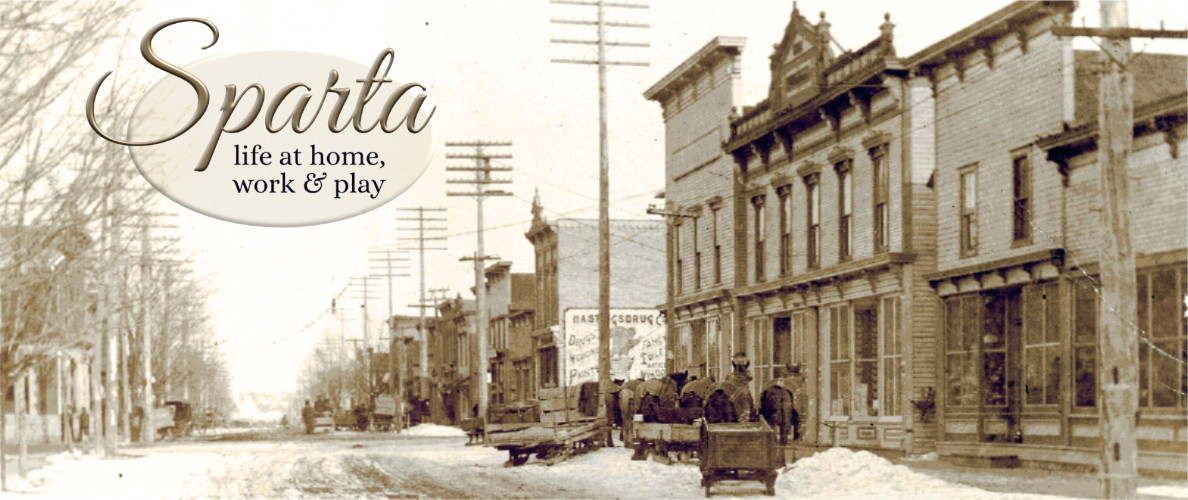

Village Articles
Competitive Spirit "Nelson A. Shaw: Horse Sense"
Businesswomen Sparta's Millinery Mavens: "Catherine Roberts & Rose Adelia Gaut: Mother-Daughter Hatters", and "Dora May Clute: Self-Made Woman"
Milo & Ben The stories of two friends and early Sparta businessmen: "Milo Bolender's Pharmacy" and "Dr. Benjamin Zudzense & His Monkeys" with "Pinckney Paints the Town"
Main Street Merchants "Charles Henry Loomis", "Frank Cnossen: There's Friendship in the Cup", and "Hugh Finch: Where You Always Do a Little Better"
Hometown Heroes "George W. Powers Murdered Lawman" and "Mad Dogs & Marshal Meeker"
The Highway Arrived State Street corridor and post-war growth: "Camp Boys Come to Town" and "Sparta Builders" addressed the housing shortage
Merry & Bright How we celebrated: "Charlie Badgerow: Two Christmas Gifts", Christmases Past", "A Very Sparta Christmas", "My Christmas Memories", and "Sparta's Easter Bunny Helper"
Millinery Mavens
Women loved wearing stylish hats during the late 1800s and into the mid-1900s. One-of-a-kind creations were in demand, with women commissioning hatters to specially design their new head fashions. Millinery establishments would host special openings to usher in a new season's latest styles in hats. "In those days," Arzie Pinckney wrote in his I Remember column, "a lady could not walk into a hat shop and say, "I'll take this one" nor did they want it that way. Everyone wanted a hat that was different from others and one that suited the shape of her face and matched the dress that one had just bought. It was nothing for a wife to order a hat and have to wait several days for it to be made to her specifications and sometimes cost as much or more than her husband's best suit of clothes. And I guess that he did not mind. Anyway after the hat was specially made, she could not return it and get her money back, so he must have gone along with it and if he was wise, he would do a little bragging as to the way he dressed his wife to the fellow that worked beside him on the next machine."
Millinery was a lucrative business opportunity for men and women who possessed a flair for design. Some of the best known women to embark in this career at Sparta (with the year of their earliest mention or advertisements located) included: Catherine Roberts (1894), Dora Clute (1901), Rose Gaut (1910), and Neva Nelson (1916). Others who were either briefly in business at Sparta or who just didn't advertise often were: Tompsett & Grant (1896), Mrs. L.H. Christy (1906), Smith & Co. (1907), "Madames Brown & Hurley" (1907), Lena Howard (1914), Lyda Ema (1926), Mr. & Mrs. Erastus Smith (1931), as well as a duo only known as the "Twin Sisters" (1945), and likely a few others.
Many who took the risk to start their own millinery business were those who got their start as an employee of Mrs. Dora Clute's shop. This is the first in a series to become acquainted with some of these enterprising women.
Catherine Roberts
& Rose Adelia Gaut:
Mother-Daughter Hatters
Evidence of Sparta's earliest known milliners is found on the 1894 Sanborn Fire Insurance Company map. In fact, it indicated the location of three such businesses. Two on the north side of Division in the Meeker building and a portion of the Morris Haas home, with the third across the street in the Ed Roberts store, which was later replaced by the landmark Peoples Bank. For a small town of 1,200 at that time, this is significant and speaks to how the resident ladies were very fashion conscious. The 1896 Kent County Directory identified proprietors of two of these businesses: "Tomsett & Grant Millinery", along with "E. Roberts Millinery and Fancy Goods".
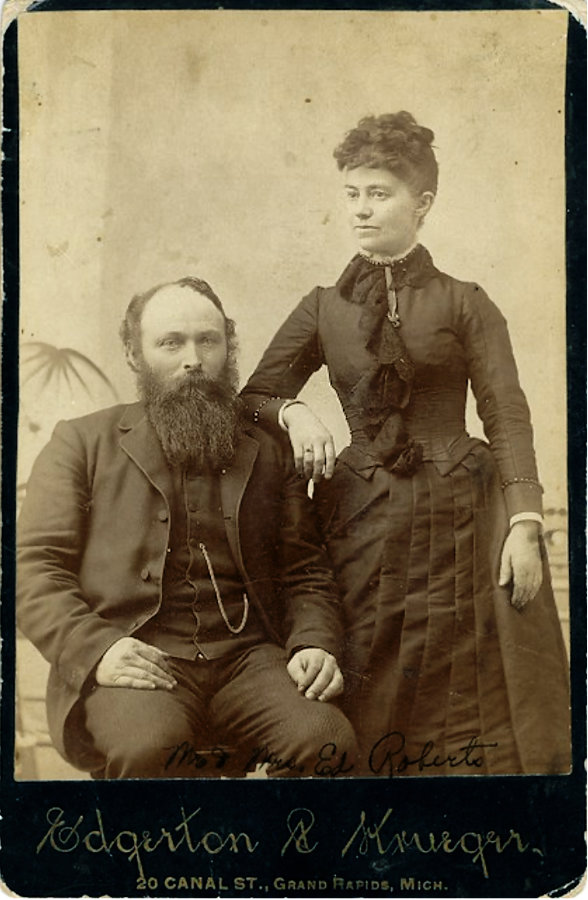
Edson and Catherine Roberts--from the Allen Collection & STHC Archives
Catherine E. Darling became Mrs. Hubert Edson Roberts in 1869 and the newlyweds began married life on a 40 acre farm at Lisbon where daughter Rose Adelia arrived the following year. Kate and Ed lived close to Catherine's parents, Elias and Hannah (Smith) Darling, and their large farm on Peach Ridge where he raised sheep, cattle, and horses.
The third child, Catherine, was born on October 24, 1850, at a hamlet also called 'Catherine' in Schuyler county New York. The Darlings removed to Kent county, Michigan in 1866, shortly after the birth of their youngest daughter, Georgianna. Elias had made an earlier trek in 1855 to view the area and was impressed with its potential. By 1870, he owned 320 acres valued at $15,000 in Section 18 of Sparta township just northeast of Lisbon. The Agricultural census taken on September 7 of that year demonstrated the success of Elias' farm as he produced 100 lbs of wool, 150 bushels of potatoes, 500 lbs of butter, 20 tons of hay, and 400 lbs of maple syrup which brought in a $2,226 income that year--worth an equivalent of $53,628.76 in today's dollars.
Born in 1845 at Scipio, Seneca, Ohio, Edson was the eldest child of Eli B. & Catherine P. (Thompson) Roberts. In the fall of 1854, Eli purchased 160 acres of forest land in Section 5, of Sparta township near Kent City where they settled. The family's "...first dwelling was an up and down board shanty, roofed with oak "shakes" and measured 20x26 feet. Indians frequently camped on the Roberts grounds, and deer and other wild animals occasionally ventured almost up to the doorway," according to a profile in the 1900 Grand Rapids and Kent County Atlas.
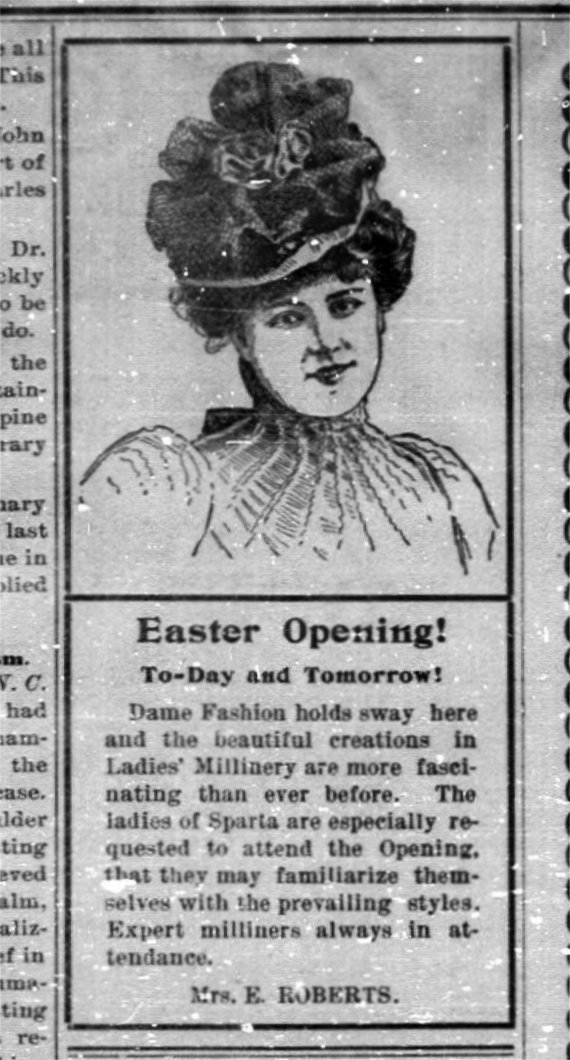
Kate's advertisement from 1901 in the Sentinel-Leader
After farming for a short time, by about 1871 Ed and Kate moved into Sparta where, in 1869, he built a store with second story living quarters for their family. Upon completion, Ed opened a shoe store. Later, around 1884, his business expanded to include a grocery in partnership with his brother-in-law, Charlie Darling. Kate established a millinery business and shared space with the shoe store and grocery. Within a few years the mens' business association failed. Ed bought out Charlie in 1890, who turned out to be a scallywag. Charlie went down the street and opened another store to sell groceries, shoes, and boots.
The grocery business was closed "when things finally got rough for Ed because of his generosity he decided he could not collect the money that was owed by many of the folks he had trusted," Arzie Pinckney wrote. "But not like so many others, he did not go into bankruptcy, but sold his stock and went to work as a carpenter and paid off every one of his creditors." The 1896 L.L. Polk's Directory included a listing for "Edson Roberts village marshall". When the 1900 Federal census was enumeration, Ed's occupation was a carpenter while both Catherine and Rose operated their millinery business. Ed's specialty was building barns and farm buildings. The Roberts household increased by two with the addition of a niece and a border. Eight year-old Ilah Gertrude Hastings, born on July 12, 1892, was the daughter of Kate's sister, Georgianna. She was raised by the Roberts since she was an infant. Noble Lawrence Gaut, also known as "Bucky", rented a room and he worked at the nearby Welch Folding Bed factory as a finisher.
The milliner's job was to create original hats for each client. Corl, Knott & Co., Ltd. at 75 Monroe and 20-26 North Division Street in Grand Rapids was an "importer, manufacturer, and jobber of millinery and straw goods". The wholesale house offered all of the materials and provided the on-site work rooms milliners required to create original hats. Their facility catered to buyers from large millinery houses located in states across the country. They held seasonal fairs to present the latest fashions and The Grand Rapids Press often published lists of milliners in town gleaned from hotel registers. A September 22, 1900, list included those from as far away as North Dakota and dozens from within the state including "Mrs. E. Roberts, Sparta, Mich." Local papers published announcements of when hatters were on purchasing trips with advertisements to follow when millinery shops would open for showings.
Wedding bells rang as Noble and Rose were married on the 22nd of February in 1902. Gladys Irene, a daughter, blessed the couple with her arrival on March 20, 1905.
During the 1870s, a building was relocated from the Hollis Hilton farm. Word was it had been intended to become a saloon just outside of the west village limits, but the prospective proprietor, a Mr. Post, failed to secure the necessary liquor license from the township. He took the case to court, but failed to achieve his goal. Consequently, the structure was placed on the southwest corner of Washington and Division streets, then a small one story shop was constructed in the space between it and the Roberts' business. Sylvanus Atherton purchased the property and over the years various businesses operated therein. The Sparta Leader newspaper and print shop utilized the space for a short period in the late 1890s before its sale in 1900 to Edgar Bloomer.
Bert Henry Putman
After Max Tyroler operated the former J.R. Harrison general store for a brief period, he sold it to Samuel & Lizzie Sweet who, in turn, conducted business only during part of 1901. The Grand Rapids Press reported (1/29/1902), that "Sweet's cash store has changed hands, the proprietor, S.H. Sweet, selling to B.H. Putman of Algoma. It is the largest exclusive grocery and bazar store in town." The 1902 Young & Co. Directory included a Sparta listing for twenty-five year old B.H. Putman who operated a groceries, flour, and feed business. Bert Henry and his father, Allen William Putnam, purchased the building on March 11, 1903. Since a local Lodge leased the second story, the Putman family rented the second story apartment of the Atherton building on the corner and just a few doors down the street. Besides the Putman men, the family included Allen's wife, Mary Cecilia (Kelley), with young daughters: Jessie Pearl, Bessie Elena, and Tressie Rhea.
Ilah, Bessie, and Tressie were close in age and quickly became friends. Bessie's son, Arzie Pinckney, wrote in his 1966 I Remember column for the Sentinel Leader, "...they (the Roberts family) lived in an apartment over the store and during the time that A.W. and Mrs. Putman lived over the (future) Putman store, Ilah used to climb out on the roof of the small building and go over and play with the Putman girls." This recollection apparently took place when Ilah was an early teen, about twelve or thirteen years old, and before the Putmans sold the Harrison building to Dora Clute and moved to Reeds Station in 1905. By the time the Putmans returned to Sparta in 1917, the girls were in their twenties and out on their own.
Bert married Josephine Elizabeth Lemunyon on the 4th of April in 1906 at which time he provided his place of residence as Algoma township and occupation as a grocer. Camp Lake, on the east side of Division Avenue, two miles north of what is now 13 Mile Road, was a popular resort get-away for locals and out-of-town guests. Bert operated the Camp Lake Resort along with a general store on the west side, served meals, and provided transportation services to the train depot in Sparta for guests. Occasionally, he advertised in The Grand Rapids Press.
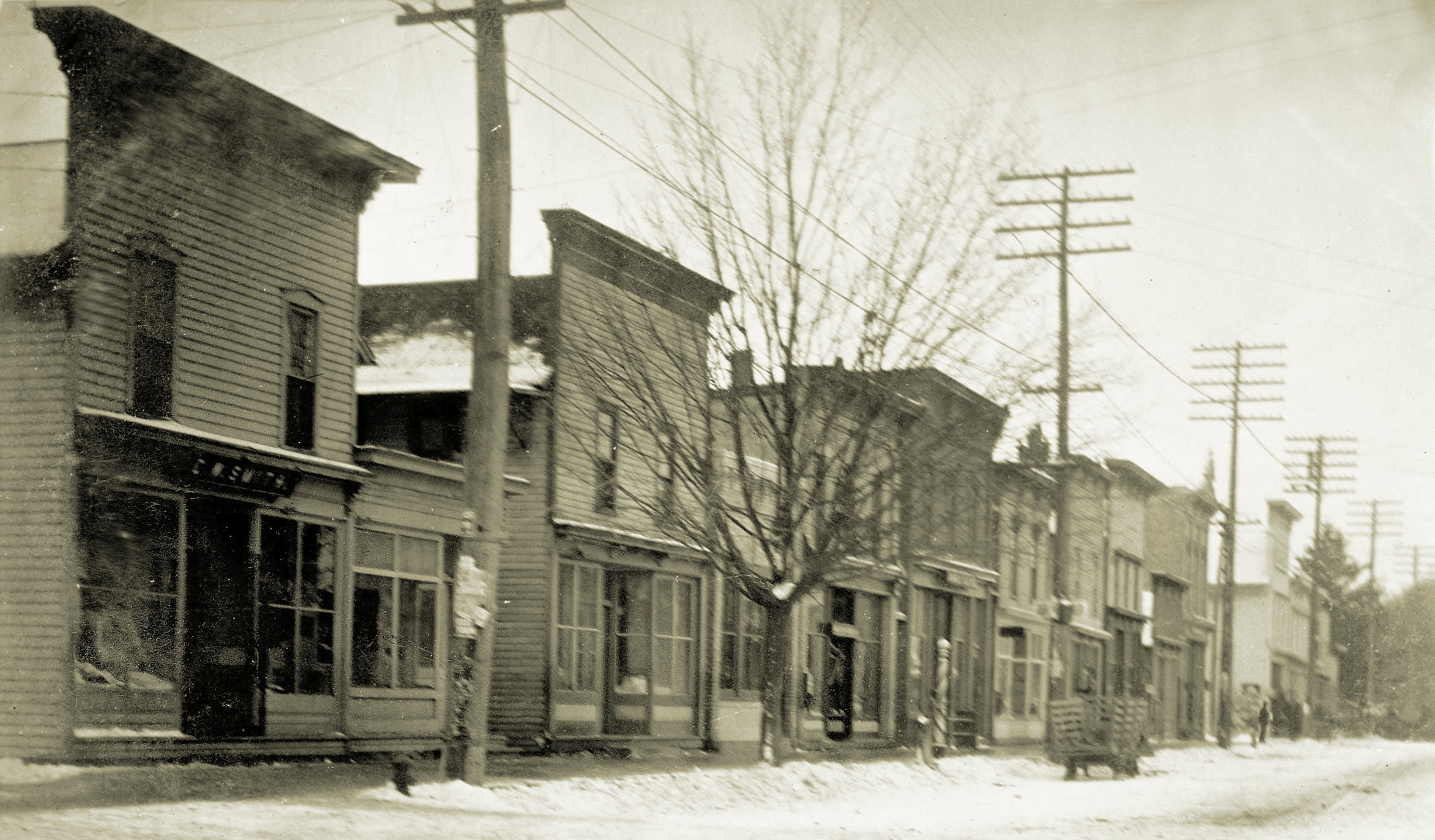
February 1909 view of storefronts on the south side of Division from the corner of Washington looking west: E.W. Smith mercantile; D.L. Brown Jewelry; Roberts Millinery; Kellogg Barbershop; Bolender Pharmacy; and Dora Clute Millinery--courtesy of the Karl Nickolai Collection
Elmer & Emma Smith
Malinda Atherton, widow of Sylvanus, passed away in 1905 and Elmer W. Smith purchased the corner store from the estate. In 1907, Smith & Co. added "...new prints, ginghams, outings and cotton goods, also our underwear, hosiery and fancy goods"--a term interchangeable with 'millinery'.
In honor of the 60th wedding anniversary of Elmer W. & Emma C. (Loveridge) Smith, The Grand Rapids Press published an article which featured the couple. They married in 1873 at their hometown of Farmington, Oakland county, Michigan and came to Sparta in 1893, "...when Mr. Smith became associated with the Hazeltine Lumber Co." After which, he ran an elevator at Grant for several years before "he owned and operated a general mercantile business here" at Sparta for ten years.
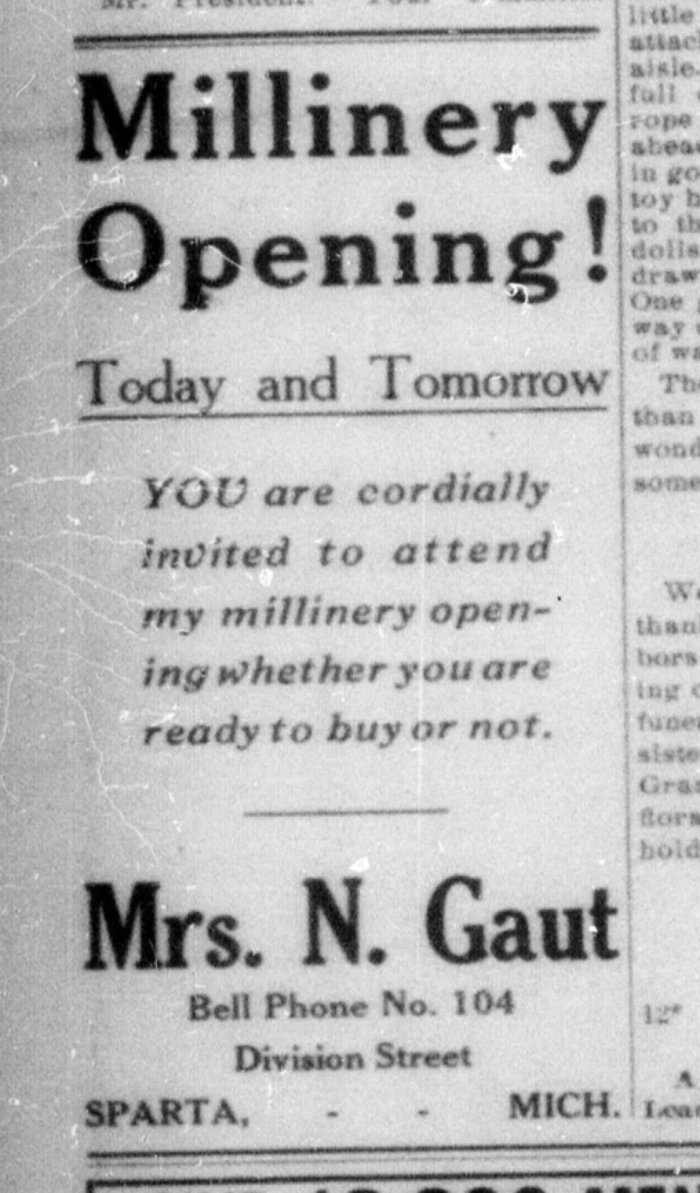
An ad for Rose's millinery from The Sparta Sentinel Leader (21 Mar 1913)
"In reminiscing, Mrs. Smith said: "The thing in my life for which I am most indebted and which has meant so much to me is that for more than 25 years I was permitted to teach a Sunday school class of young people in the Methodist church." The profile continued, "Having lost their only children at the ages of 9 and 14 by diphtheria, Mr. and Mrs. Smith sought to fill the great loss by surrounding themselves with young people who made the Smith home their home."
Allen & Mary Putman were empty nesters by the enumeration of the 1910 Federal census which indicated he was a storekeeper at Reed's Station in Algoma township. Several years later, in 1917, A.W. & B.H. Putman purchased the property from Elmer Smith to reestablished their dry goods and grocery store in Sparta, which later became known as "Putman's Cash Store". Bert's family resided in the upstairs living quarters for awhile and the father purchased a nearby home on Centennial. Bert and Josie's daughter, Doris Lucille, arrived on August 4, 1918, at Sparta. The Putman family continued to operate their dry goods store until Bert sold it in 1946 to Harvey Scott, a war veteran, as The Grand Rapids Press noted.
Passing the Baton
By 1910, Kate retired and Rose temporarily went to work as a milliner for Dora Clute. The census that year in April indicated Ed was a house carpenter, Noble had become a machinist at a factory, and both families were members of the same household. Darwin L. Brown's jewelry store moved into the Roberts storefront which freed up space for Mrs. Emma Smith's millinery in the small one-story space next to their business.
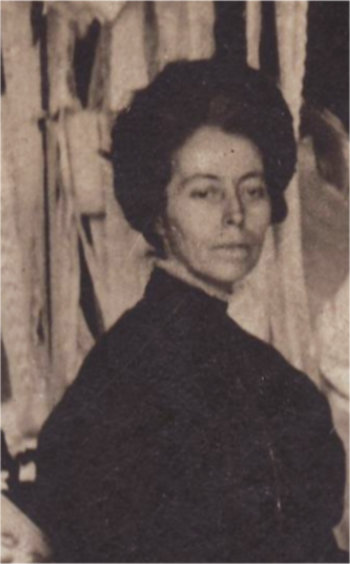
Rose Gaut in 1910 while she worked as a milliner for Dora Clute--from the Allen Collection & STHC Archives
Dr. Benjamin J. Zudzense, famous for the monkeys he kept, died in August. Ed purchased the doctor's large home across the street (where the village parking lot is today) to become the family's residence and converted the front room for Rose's hat shop. In September (1910), Ed sold their former home and commercial building to investors who planned to build a newly organized financial institution, the Peoples State Bank, the next year.
Once Mr. Roberts completed the work to convert the front room (formerly an indoors monkey cage while the doctor resided at the house) into a millinery shop, Rose opened her new business under the name of "Mrs. N. Gaut" and was very well received by her clientele. Her advertisements appeared regularly in the newspaper and her business prospered. Sometimes she placed classified ads soliciting young ladies interested in learning the business to enter her employ. She also began renting extra bedrooms to boarders.
Following a brief illness, Catharine unexpectedly passed away on December 2, 1915, at sixty-five years of age.
In response to the popularity and growth of Rose's business by 1918, she hired Mrs. Maggie Miller and Miss Delma Lauffer as assistants.
Noble Lawrence Gaut
Life began for Noble at Carlton in Barry county, Michigan, on 30 Mar 1875, for the youngest son of Jesse Louis & Emeline (Starkweather) Gaut. He was raised at Vermontville in Eaton county where his father died when the boy was twelve. As a young man, Noble landed a position at the Welch Folding Bed factory--which brought him to Sparta and the good fortune of renting a room from the family of his future wife. The out going, good natured young man soon assimilated into the community. When Sparta's first band was formed, Noble joined the brass band and learned to play the trombone and baritone. First known as the Cleveland Band and later as the Sparta Band, they gave concerts, played in area parades, special events, the Ravenna Jubilee, and entertained at Camp Lake.
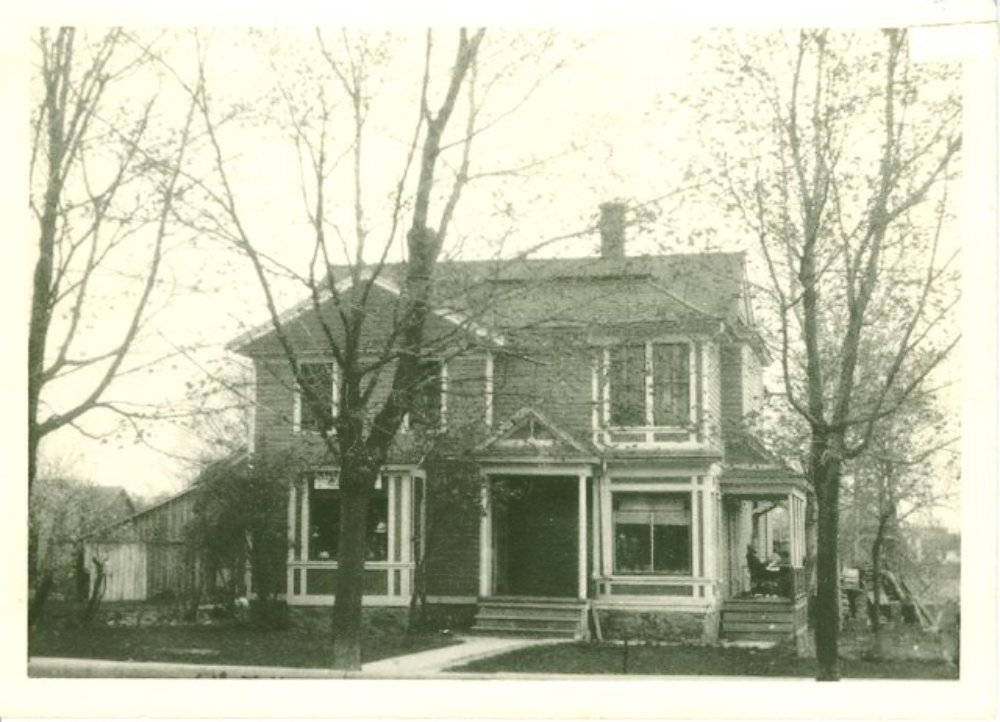
The Gaut home and Rose's shop--from the Allen Collection & STHC Archives
Noble left factory work and started his own successful delivery business in 1912. Known for his wittiness, Noble Gaut's commentary occasionally appeared in print. Such was the case when on April 12, 1918, the local paper published "VIGOROUS DENIAL--"After all," says August Johnson, "this setting ahead of the clocks is only a relative matter." "No relative of mine," says Noble Gaut, who worked on the early shift." This was in response to the newly instituted Daylight Savings Time portion of the Standard Time Act intended to save energy during World War I, but unpopular from the start.
Noble's delivery business suffered a serious set back as the (10/2/1918) news reported "SPARTA VISITED BY EARLY MORNING FIRE". The Ella Covert home and G.E. Spicer barn were damaged and "...a barn used by the Gaut general delivery service was burned to the ground... Gaut's horses were saved, but a delivery wagon, harnesses, grain and two tons of hay were burned."
In addition to the Gaut family and Rose's father, the 1920 census for their household included boarder Allen Saur employed as a house carpenter, who probably assisted Ed, along with four other roomers who worked at the furniture factory: Thomas Ocinmer, Zee Maciejewski, Andy V. Holmes, and Perry N. Fuller.
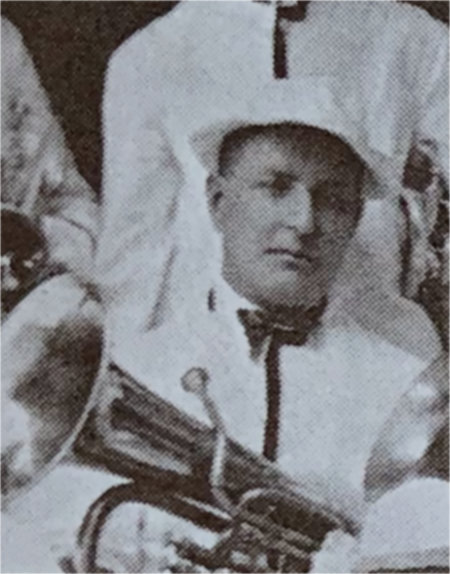
Noble Gaut with his baritone while a member of the Sparta Band--from the STHC Collection
Splashed onto the Sentinel Leader's front page, a headline read "NOBLE GAUT OVERFLOWS WITH WORDS OF CHEER". The (1/6/1928) article continued, "Noble Gaut has a habit of going around town and jollying up folks and especially at the holiday season. On Saturday his greeting was so unusually full of good cheer that Miss Mary Rogers was compelled--and yielded to the temptation..." to write a poem in his honor.
The family patriarch passed away on November 6, 1928, after a lengthy battle with pneumonia. Edson was just days short of his 84th birthday.
The 1929 Christmas holidays brought a new cause for celebration as Gladys Gaut and Charles C. Saur, the son of Nelson & Wilhemina (Anderson) Saur, were married. The newlyweds were educators. The bride, a teacher who would go on to become a principal and an assistant professor at Western Michigan college. The groom was a superintendent at Sparta and Godwin Heights.
Noble and Rose continued to work as they neared what is now considered the age of retirement when the 1930 census was taken. Only one lodger was recorded, Guy Bristol, a 59 year old naturalized Canadian who was divorced and unemployed... my great-grandfather. Guy had worked his entire adult life as a moulder at factories in Illinois and Michigan. Most recently, in Sparta. By then he was unable to work and soon succumbed to heart disease which he had suffered for at least three years.
Rose became a widow on July 8, 1937, when heart failure took Noble's life. A year later, she gave up her grand old home. Too large for one person, she took an offer for the property and resumed her millinery business from her new home at 29 Washington Street. Lodgers who appeared with her in 1940 included: Rupert Cavanaugh, 27, employed at the milk condenser; Gerald & Mary Cook, 25 and 24, teachers. Passerbyers enjoyed her skillful window displays beckonning ladies to shop the latest styles.
"On July 8, 1938, the late Lyle O'Connor, then postmaster of Sparta, received word from Washington that a new post office would be built in Sparta and that $70,000 had been allocated for that purpose," The Grand Rapids Press reported (26 May 1949) in Sparta May Get Federal Building Says Cong. Ford. The Zudzense-Gaut and Littlefield properties were slated to become the location for a new post office. Federal engineers visited the village in preparation of drawing up plans. However, after the Littlefield home was relocated to Mark Street and the Zudzense-Gaut property was dismantled and disposed of the project was dropped due to World War II. The remains of the Gaut home were reused by the Sparta Builders in other homes.
The story of a family who created beautiful head apparel for the women of Sparta for about 75 years continued into the 1950s. (Her lovely Victorian home at the northwest corner of Washington and Centennial was reassigned to be "155 Centennial".) By the time Rose finally retired, she had been a milliner for fifty years.
Dora May Clute:
Self-Made Woman
Near Lisbon, Michigan, on February 7, 1863, a daughter named Medora May, who would be called Dora, was born to Benjamin Franklin & Martha Eliza (Smith) McNitt. The family left Lockport, New York, in 1858 and arrived at Marne, Michigan, prior to settling at Lisbon. Well-known as 'Frank', he was a skilled carpenter, joiner, and a Civil War veteran who served in Company E of the 15th Michigan Infantry. Once he settled his family into a log house on a Sparta township farm just north of Lisbon, he won the contract to construct a schoolhouse. As he prospered, Mr McNitt invested in real estate and became a landlord.
The McNitts were talented in music, recitation, and as thespians. "It is most improbable that any of Frank McNitt's young people ever consciously strove for what we call culture, but they were full of energy and the urge to self-expression. Amateur theatricals offered something interesting to do, and many plays were produced by the younger set in Lisbon. It appears they were well done, too, considering everything. Nothing too heavy or ambitious was tried; just the things that would be fun, and could be carried off lightheartedly." Dora's nephew, Virgil V. McNitt, wrote in his book The Macnauchtan Saga, "Sometimes the amateur players ventured into other communities with performances."
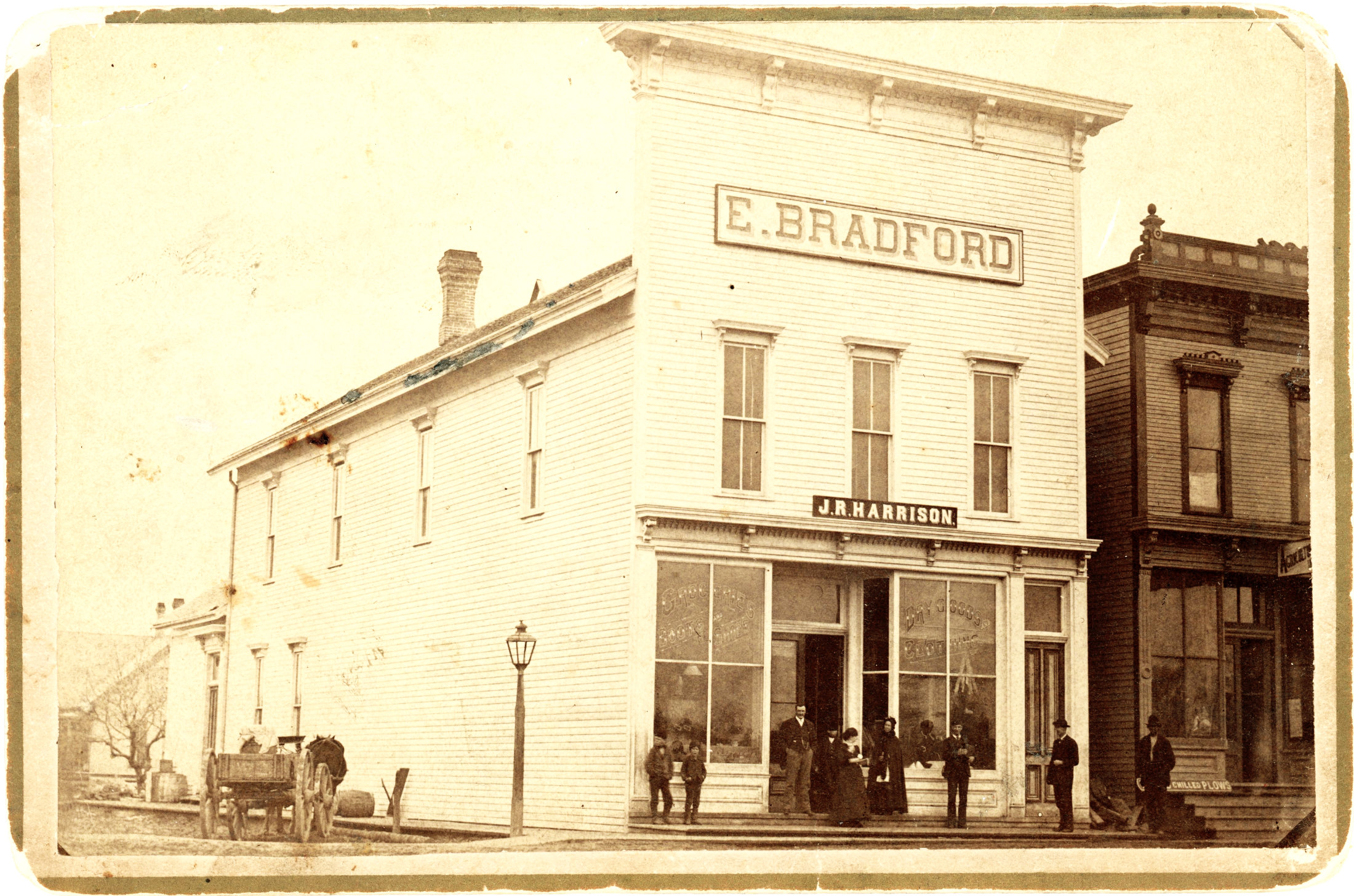
1st location of J.R. Harrison General Store at Sparta, Joseph Harrison standing in doorway, Dora McNitt looking to the right, and Alice Harrison wearing a cloak. Windows proclaim: Groceries, Boots, Shoes, Dry Goods, and Clothing. Photographer Wallace White--from the Allen Collection & STHC archives
Joseph & Alice Harrison
Dora's first job as a young woman was at the J.R. Harrison store. Owned by her eldest sister, Alice Francis, and brother-in-law, Joseph Rhodes Harrison, Dora gained valuable business experience as a clerk. The 1882 edition of the R.L. Polk & Co Kent County Directory included a listing for the young woman: "McNitt, Miss Dora, clerk, Sparta Centre". By then, successful J.R. Harrison General Stores were established at Sparta and Lisbon as the couple had recently relocated their family to Sparta Centre. The original site of their Sparta business was in the "E. Bradford" building, later where AA Johnson conducted business, on the southwest corner of Division and Union--then Mill Street.
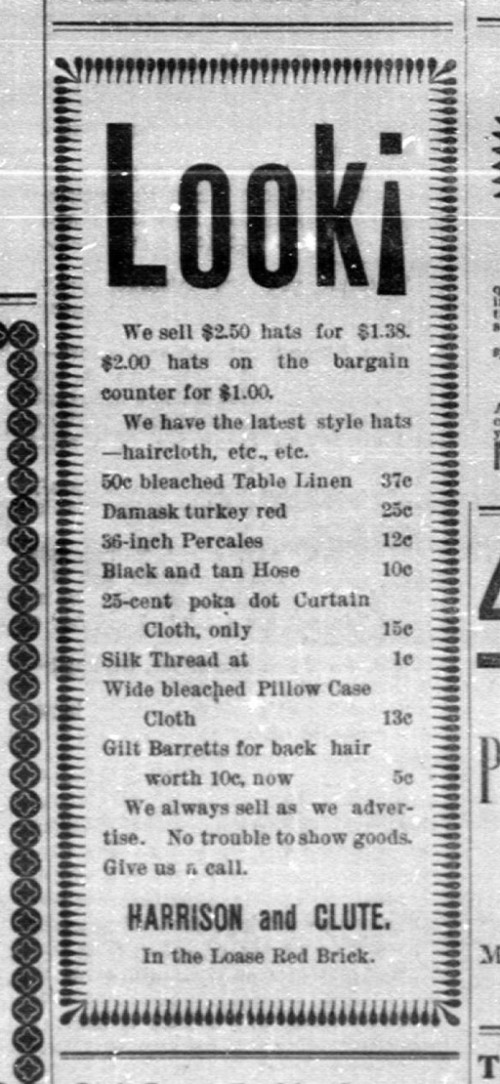
Advertisement for Harrison and Clute in a May 1901 Sentinel-Leader
"I remember Mr. and Mrs. Harrison very well. They had a store with dry goods as well as fruit, candy, and tobacco," Arzie Pinckney recalled in his 23 Nov 1966 Sentinel Leader column. "Mrs Harrison was crippled, one leg was shorter than the other..."
"Earlier copies of the Sparta Sentinel from 1883 and 1885 were discovered in 1969 in the home of Raymond Snyder at 47 Centennial. These fragile newspapers were made available to Arzie for his weekly column in which he highlighted products advertised by the Harrisons from the December 20, 1883, issue: lamps, pendant lamps, underwear, pocket cutters, razors, "genuine Gum Rubber Crackproof Boots", "the best 5 cent soap in the Nimble Nickel", and "Everything in the way of useful presents for Christmas at Harrison's which is just what you want this year."
Another of Arzie's columns humorously elaborated on tobacco sold at their general store. "The Celebrated Nimrod Plug tobacco, for sale at Harrison's. If you try it, you will chew it. If you chew it, you will have no other," so the slogan went--Mr Pinckney then editorialized: "The paper doesn't say whether it will make you so sick that you will never chew tobacco again or whether it is fatal."
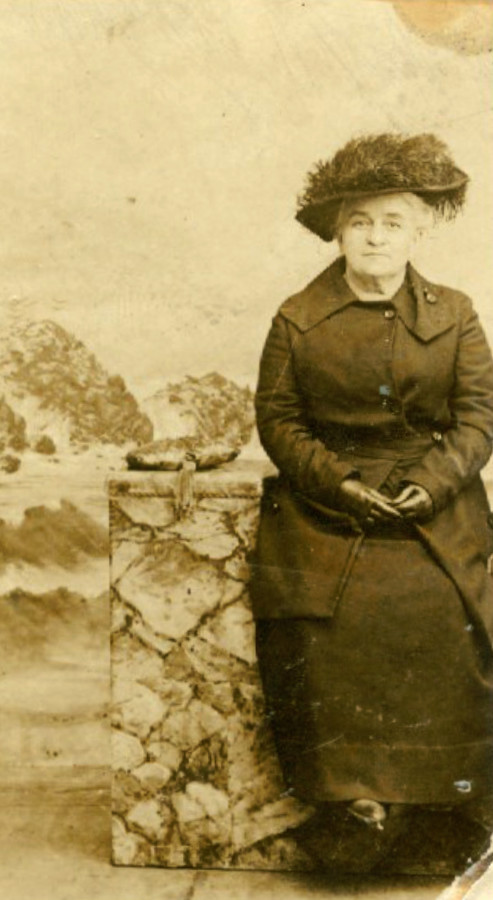
Mrs Dora May (McNitt) Clute portrait from the STHC Archives
The Harrisons took merrymaking to a new level at Sparta. On occasion, when the workday was done and the 'closed' sign placed in the window, the festivity began. An item dated 20 Dec 1883 from The Sparta Sentinel "...told about an interruption at a banquet which was spread in the hall over the J.R. Harrison store. There would be literary exercises in the new hall and dancing in the store below." Arzie Pinkney then quoted from the news account: "The latter part of the program was fully carried out until the wee hours of the morning. The audience that returned to the hall were pleasantly entertained with short and spicy speeches by Messers Maynard, Cheney, Voorheis, Hallack, and others and excellent vocal music by the Glee Club and instrumentals by the Amidon Boys (probably Elmer and Charley). The occasion was full of interest to all present and reflected great credit upon the fraternity."
A new store was erected "...in 1890 and the brick was made in the Sparta brickyard owned by a Mr Warner," Mr. Pinckney stated. About seventy years into the future, the building would become Paris Bakery.
"I remember that they used the upstairs for home talent plays. One I remember was some sort of wild play. Anyway it required that a shot be fired backstage and when the night of the play came they could not get any blank cartridges for the revolver so the shot was fired out of the window but the bullet went across the street into the front window of the barber shop and imbedded itself in the back of the barber chair." This would have taken place sometime between 1895 and 1900 judging by a barber shop located across the street from Harrison's on the Sanborn Fire Insurance Company maps.
The 1890s found Dora in the classroom as she taught school in Kent, Ottawa, Muskegon, and Newaygo counties--before she accepted a proposal and settled down to married life.
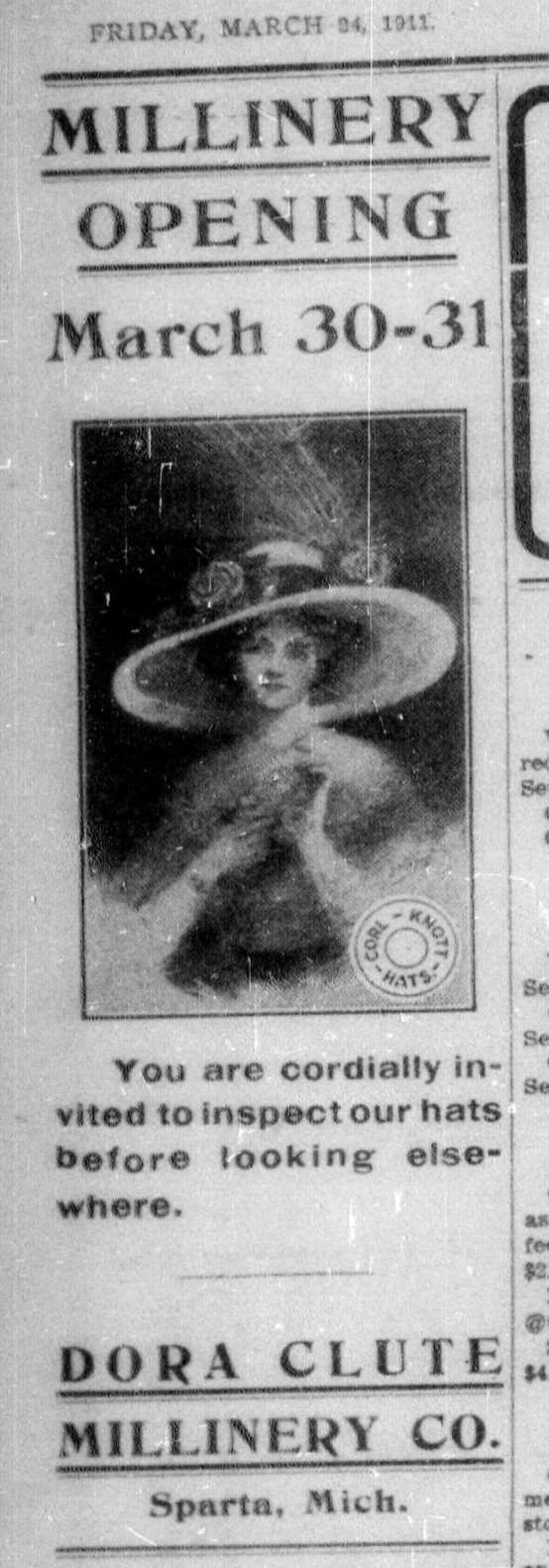
1911 Advertisement appeared in the Sparta Sentinel-Leader
At the age of thirty-five, Dora was ready to take on the role of wife, mother, and homemaker. She and Chapin A Clute, a widowed farmer from Tyrone township, were wed in 1898--her first and only husband. "A designing farmer named Chapin Clute, a widower with grown sons, offered a bleak promise of romance when Dora neared middle age." V.V. McNitt, described the events that unfolded in his book The Macnauchtan Saga, "When at the end of six weeks of marriage Dora discovered his only yearning was for her money, she sent Verner a distress signal, and he came with horses at the gallop. Clute and sons offered resistance, but Verner brushed them aside, loaded his sister's belongings into his light wagon, and drove with her rapidly to the old homestead." Verner was the youngest McNitt sibling. For all of her life, Dora was a hardworking frugal woman who had amassed a sizable nest egg. Although the romance swept her off her feet, the honeymoon was swiftly over and the newlyweds went their separate ways. Her world was turned upside-down.
Dora returned to her parents' home and decided to pursue a business career in retail sales. Alice's husband, Joseph, died from pneumonia in 1899 and the widow managed the business until she sold it to Max Tyroler, a Hungarian immigrant, but maintained ownership of the building. Arzie Pinckney told the story of how one 4th of July the Tyroler son, Joseph, picked up an unexploded firecracker. "The crowd all yelled at him to leave it alone but he didn't listen to them so just as he got it in his hand, it went off and blew the inside of his hand out." Arzie wrote, "I was standing right near the edge of the sidewalk and I saw his hand as he came running up to his father. Joe was about my age. The Tyrolers did not stay in Sparta very long."
Alice opened a confectionery shop after Joseph's death, then as "Harrison and Clute" formed a partnership with her sister to sell hats and dry goods "in the Loase Red Brick", as their May 1901 ad indicated. Charles G Loase was known as "The Hardware Man" and conducted business on the north side of Division across from the Harrison building and next to the barber shop with the bullet in the chair. Alice married George Kelly and left town. The couple lived at Webber in Lake county where he worked as a sawyer at a saw mill and she had a grocery store. Encouraged to take on the business on her own, Dora followed in her entrepreneurial sister's footsteps--and soon purchased a storefront to pursue her own business enterprise.
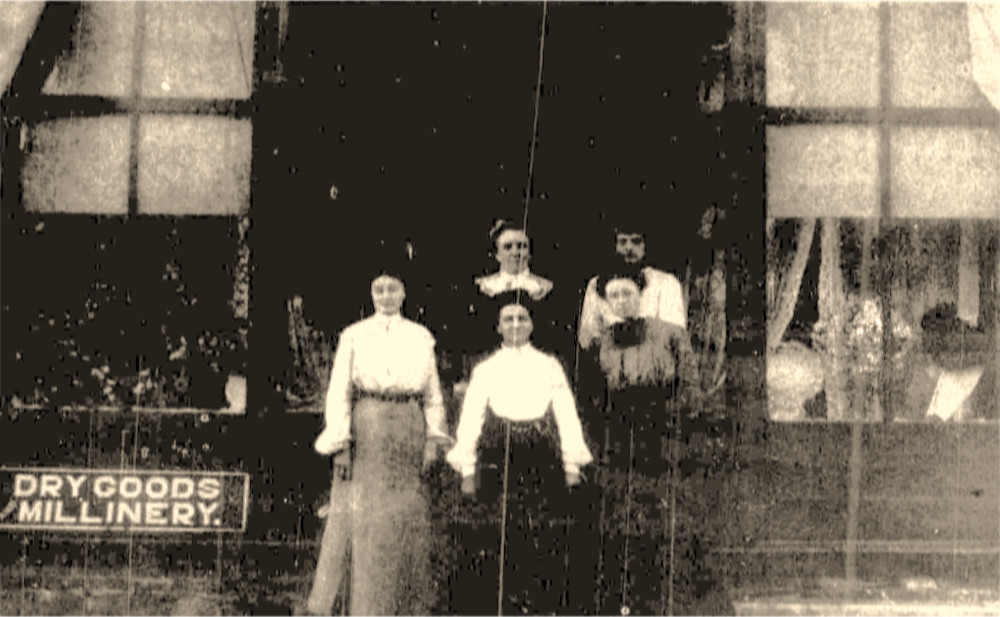
Dora Clute Dry Goods and Millinery shop. From left, back row: Dora Clute, Myrta Brown; front row: Myra Gregory, Anna Nelson, and Marvette Myers
Dora Clute's Millinery Shop opened at 157 E Division, on the north side of the street, just west of what would someday become Paul Lawrence Jewelers. Previously, the Cramner Cigar Factory had used the space. By 1904, Dora had expanded her merchandise to include dry goods. Mrs. Myrtle Brown was hired as the head milliner and purchaser. Several years later, she and her husband, Orley, would build Brown's Opera House on the east end of town. Always the teacher, Dora brought students and young ladies into her employ to learn the art of millinery and sales.
"In 1904, Bert Putnam had a grocery store there and his father, A.W. Putnam, worked for him, and Ray Fonger was his delivery boy. Every grocery store had a delivery service." Arzie wrote about other businesses that occupied the Harrison building, "Bert didn't have it very long when he moved his business over to Camp Lake..." He operated the Camp Lake Resort.
Divorce was slow in coming. Several months after it was finally settled, The Grand Rapids Press headline reported on a tragic story dated October 11, 1907: "WITH BROKEN NECK--Chapin Clute Lives In Spite of Fractured Spine--Falls From Ladder--Farmer Meets with Injury While Picking Apples--Although paralyzed from the head down victim of accident has slight chance to get well." Mr Clute expired five days after the fifteen foot fall.
Mrs Dora Clute's business prospered
"I remember," Arzie recollected the Harrison building's history, "that the building was vacant and Albert Betterly held dances there every Saturday night summer and winter. Just when Mrs Dora McNitt Clute, a sister of Mrs Harrison, moved her millinery store from across the street... I do not know. She moved into the Harrison building and put in a stock of dry goods. Mrs Myrta Brown, then Myrta Miller, was her head milliner. She worked for Dora for several years then she decided to go into business for herself..."
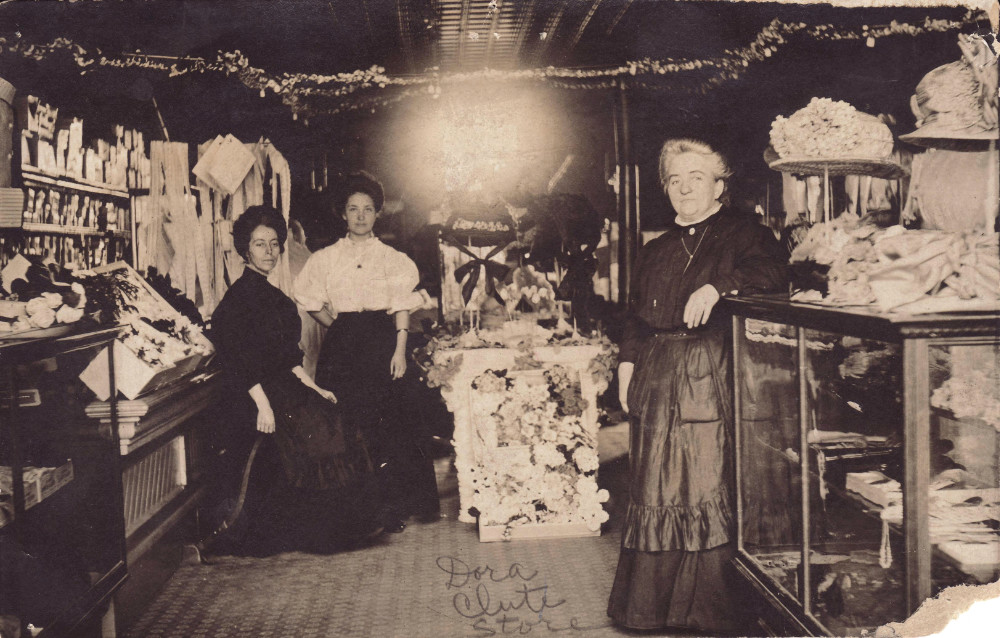
Dora Clute inside her shop with Rose Gaut and Dora Anderson--from the Allen Collection & STHC Archives
The Grand Rapids Press took note of Sparta's success and growth with a page-and-a-half feature on November 14, 1908, entitled "SPARTA--A PROSPEROUS TOWN One of the Rising Villages of the State--Public Spirited Citizens, Fine Manufacturing Plants, Excellent Homes, Rich Soil, Good Business Houses, Strong Churches and Efficient Schools, Make It An Ideal Place in Which to Reside." In the popular style of the day, headlines told the story. Many local businesses placed advertisements, including Mrs. Dora Clute, who promoted her "Dry Goods and Millinery, Ladies Furnishings and Colonial Goods".
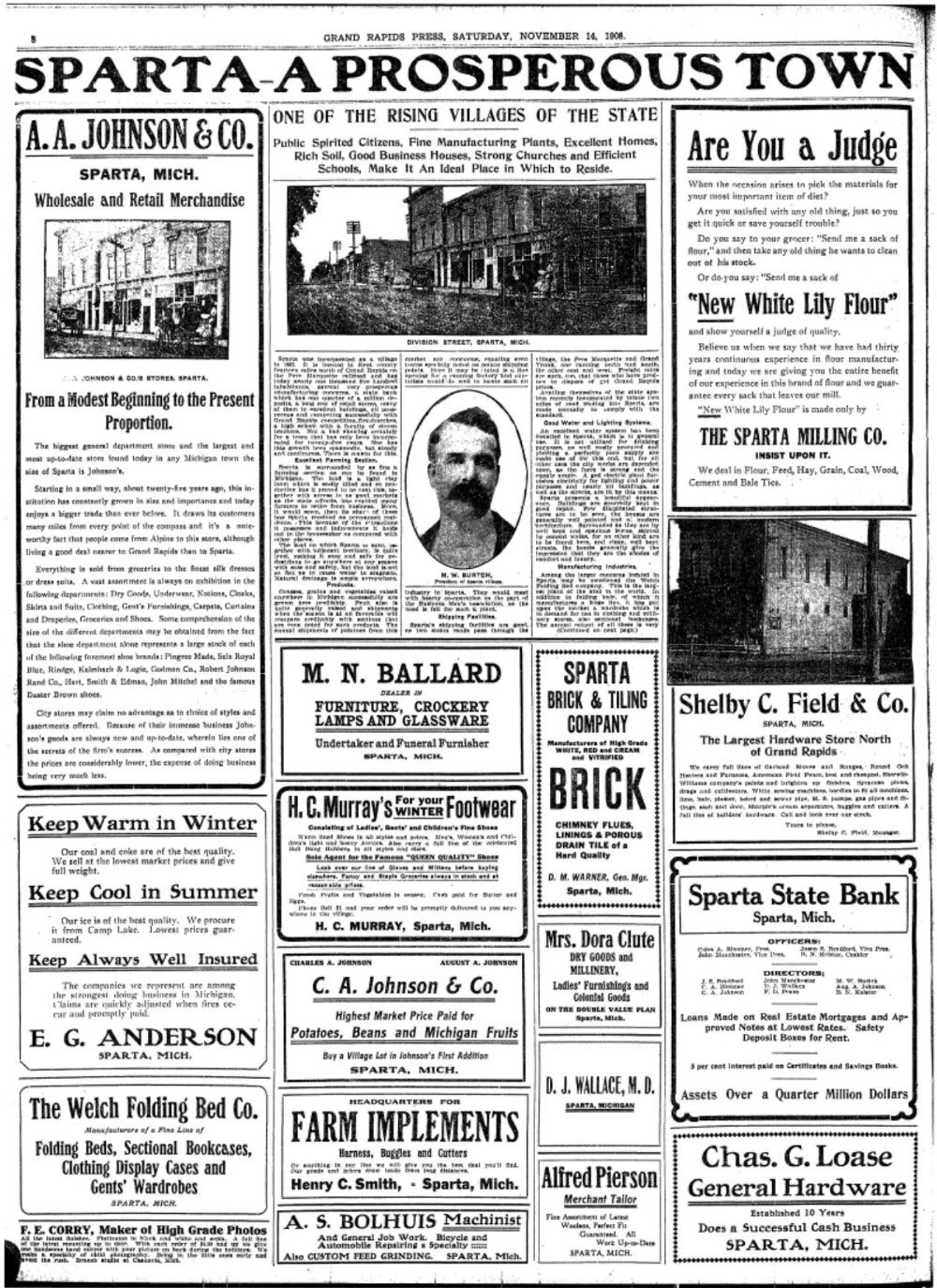
Grand Rapids Press feature on Sparta from 1908
1910 was a good year. Business grew and in response Mrs. Clute hired Miss Orpha Finch of Cedar Springs and Miss Beulah Beatty of Baldwin to assist Mrs. Rose Gaut in the millinery department. Dora's local newspaper ads generally included the phrase "Butter and Eggs in Exchange".
Possessed of a strong belief it is better to provide a helping hand than a handout--to offer education and opportunity to those in need--to equip them to rise above their circumstances, Mrs. Clute put her belief into practice. On the 30th of August, 1918, she penned a full column published by The Sentinel-Leader that described a CONVERSATION BETWEEN MRS SPRAGUE AND MRS CLUTE. Mrs Sprague rented an upstairs apartment from Mrs Clute and with her husband away in military service her finances were tight due to a delay in receiving his pay. She offered to leave her stove as collateral until funds were available to cover her rent, to which Dora agreed. Later, word came that Mrs Sprague's son had suffered a broken leg so Mrs Clute paid them a visit. She offered to install a bath upstairs but the mother had already begun packing to make the move back home. However, she was without any funds to make the trip. Dora kindly made an offer to hire her, teach her to clerk, and provide three furnished rooms upstairs. Although Mrs Sprague didn't take her up on the offer, Mrs Clute's generosity and kind effort to assist spoke well of her character.
Successful Sparta Woman Celebrates 18th Business Anniversary
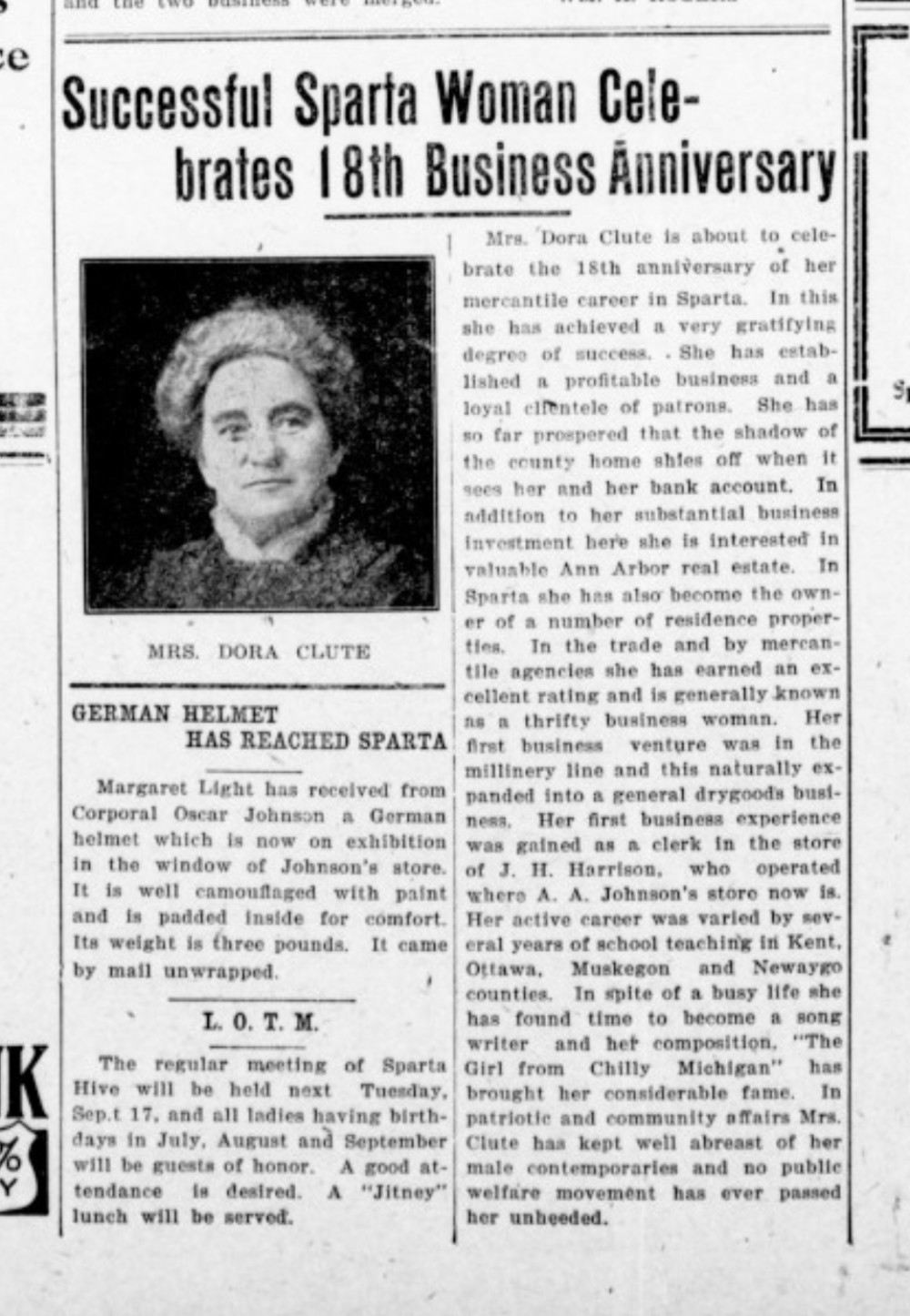
Sentinel-Leader article commemorated Mrs Clute's business presence in downtown Sparta
"Mrs Dora Clute is about to celebrate the 18th anniversary of her mercantile career in Sparta. In this she has achieved a very gratifying degree of success. She has established a profitable business and a loyal clientele of patrons. She has so far prospered that the shadow of the county home shies off when it sees her and her bank account. In addition to her substantial business investment here she is interested in valuable Ann Arbor real estate. In Sparta she has also become the owner of a number of residential properties. In the trade and mercantile agencies she has earned an excellent rating and is generally known as a thrifty business woman. Her first business venture was in the millinery line and this naturally expanded into a general dry goods business..."
"In spite of a busy life she has found time to become a song writer and her composition, "The Girl from Chilly Michigan" has brought her considerable fame. In patriotic and community affairs Mrs Clute has kept well abreast of her male contemporaries and no public welfare movement has ever passed her unheeded."--Sparta Sentinel-Leader printed on September 13, 1918
In addition to music, Mrs. Clute wrote poetry and was an officer in the Ladies Literary Club. She was part of the Sparta Baptist Church Friendly Bible Class in the early 1900s and served as an officer of the Sparta W.C.T.U. during the 1940s. She supported the Red Cross as she donated a portion of sales to the organization.
Alice, the Postmaster at Peacock in Lake county, came full-circle when she returned to Sparta and in December 1918, purchased William Kennedy's stock of groceries and store fixtures. "For some years, Mrs. Harrison, who had married a Mr. Kelly came back to Sparta and put in a grocery store in the basement of the building," Arzie referred to the old Harrison building where Dora conducted business. She had an opening cut in the sidewalk which at that time was wooden, and put in a stairway to the basement store..."
The sisters resided at Dora's beautiful home on Washington Street when the 1920 census was taken. Dora's occupation was operating her own "dry goods store" and Alice had a "grocery store".
The Harrison building was a Sparta landmark that remained in the family for about seventy years.
Contact
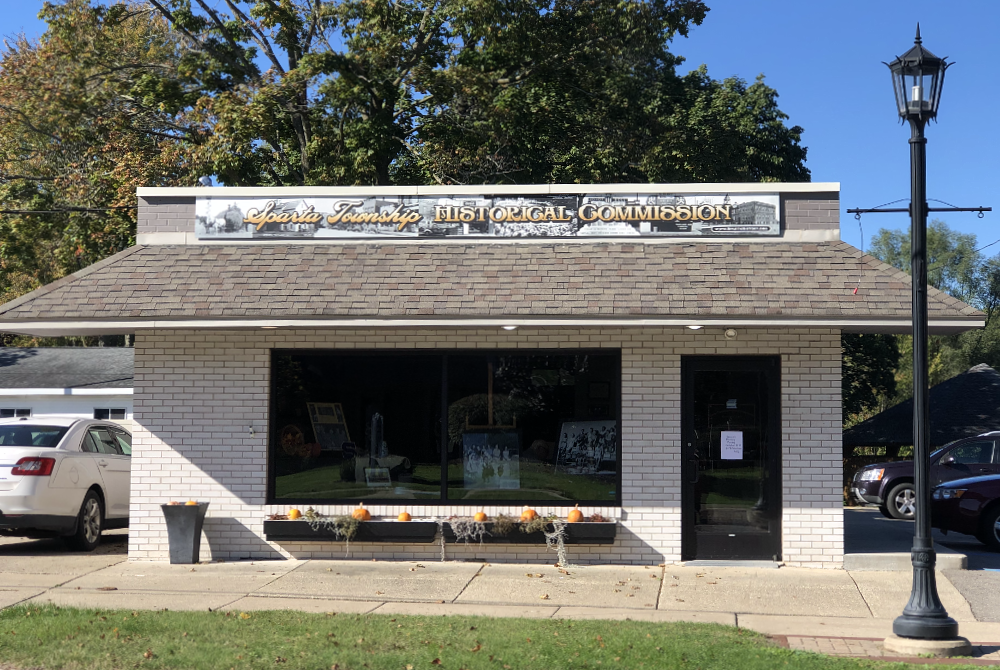
Sparta Township Historical Commission headquarters at 71 North Union Street
Our History Center is conveniently located at 71 North Union Street in downtown Sparta. Please join us for coffee and lively conversation on Monday mornings. Visits to the History Center can also be scheduled by appointment, for your convenience.
We do not receive mail at the History Center, instead, please use our mailing address, which is:
attn: Sparta Township Historical Commission
Sparta Township
160 E. Division St.
Sparta MI 49345
Our complete archives are now available online for your convenience. Just click STHC PastPerfect Catalog Access and begin your research!
For other inquiries, the Sparta Township Historical Commission can be reached by phone at: (616)606-0765 or via email at the following address:
